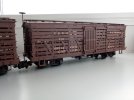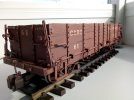Yes and thanks. That is a very good idea. I am going to get a very fine paint brush to do touch ups. Silly place to put a logo cus the friction from plowing snow will make it not last anyways. Getting there. I am securing the sides of the plow then add the bottom scooper to the plow. Then more trials.You can reduce the bleed under by applying the mask then spraying a coat of the black to seal the edges before spraying white.
Any advice on vinyl lettering?
- Thread starter ge_rik
- Start date
You are using an out of date browser. It may not display this or other websites correctly.
You should upgrade or use an alternative browser.
You should upgrade or use an alternative browser.
I used to work for a Builders Yard that did vinyl lettering on tea and sweat shirts. The design was cut out then heat pressed to the shirts in a sort of trouser press. Not a lot of good for us but I wonder if a quick blast with a Hair Dryer might do the job, experiment in some waste first! As for getting the lettering into planks, perhaps pressing in with a scriber will work.
That's what I do on planked surfaces - it has worked for the last fifteen years or more....you have to use enough force to permanently 'distort' the lettering into the grooves - on 1/20.3 this is quite easy, but in scales where the 'planking' is finer, a worn-out fine-tip ball-point pen can often be better.
-
3
- Show all
I got someone to cut me some freight wagon lettering in vinyl "as a favour", so I don't kno w what kind of vinyl was used, but I had no difficulty applying it to planked wagon sides of models in both plastic and cardboard, using a thin blunt tool to press it into the grooves straight away. Not overcoated with anything. Still there ten or more years later. While mine were gloss vinyl, the gentle use of wire wool took the shine off.
In commercial operations, the vinyl is often applied to a surface previously sprayed with water. This allows the vinyl to be slid around until correctly aligned, and then the residual water "squeegied out" (from the centre outwards, of course). I'm sure this would be "overkill" for our sort of applications.
To the best of my knowledge, the "vinyl" used for garments is a different thing altogether, relying on heat to bind it to the (porous) fabric. I'm pretty sure that the removal of vinyl lettering from vehicles is made easier by the application of hot air . . . so the hairdryer idea might be counter-productive in our use of vinyl.
I'm currently looking for a company which can supply me with vinyl lettering (block capitals) as small as 5mm height. I found one online (before the pandemic) who gave me a good price . . . but they stopped responding to my emails (perhaps they realised how fiddly it would be for such a modest return).
All the best
David
Del Tapporo over in the US is THE man for vinyl lettering and logos of all scales - he even does graffiti!!!
-
1
- Show all
I buy in my lettering from Cornwall Model Boats as since the close of Glendale(sob sob) my dry rub lettering sadly dried up.So I turned to vinyl instead and building custom cars I have vertical boards on box cars and horizontal on gondolas and such. Through trial and error I now have good results with the new type. They do need some work to affix properly so the way I do it ? Make sure the paint is dry,then using a hair dryer warm the car gently, position the letter on the car but do not stick down and then using the back of a modeling knife work from either side or top across or down the letter pushing into the boardline/grain and then once in position run the hair dryer over the letter and run the knife over again for final fix,once cool a coat of matt enamel varnish to seal and then a body colour wash to tone back if needed.
Would other vinyl`s work in the same way I`m thinking as different glues and such like would make a difference ? Not sure.

Would other vinyl`s work in the same way I`m thinking as different glues and such like would make a difference ? Not sure.


-
9
- Show all
maxi-model
UK/US/ROW steam narrow gauge railways 1:1
BECC ? I use them myself. On my SAS/SAR stock. Limited font types but plenty of point size a colour variations. You can spry them any colour you like if you want. Do lining as well. MaxI buy in my lettering from Cornwall Model Boats as since the close of Glendale(sob sob) my dry rub lettering sadly dried up.So I turned to vinyl instead and building custom cars I have vertical boards on box cars and horizontal on gondolas and such. Through trial and error I now have good results with the new type. They do need some work to affix properly so the way I do it ? Make sure the paint is dry,then using a hair dryer warm the car gently, position the letter on the car but do not stick down and then using the back of a modeling knife work from either side or top across or down the letter pushing into the boardline/grain and then once in position run the hair dryer over the letter and run the knife over again for final fix,once cool a coat of matt enamel varnish to seal and then a body colour wash to tone back if needed.
Would other vinyl`s work in the same way I`m thinking as different glues and such like would make a difference ? Not sure.View attachment 309342View attachment 309344
Yes,BECC. As you say a limited range and they stand up well to outside use, I have used their flags too.BECC ? I use them myself. On my SAS/SAR stock. Limited font types but plenty of point size a colour variations. You can spry them any colour you like if you want. Do lining as well. Max
I would suggest making stencils and masks, but then instead of spraying, use printers ink or thinned acrylic and apply thin coats with a roller.
This is how commercial models are painted and it works very well on surfaces such as planking.
Practice first, as you will be amazed how little ink you need for consistent and solid looking lettering.
This is how commercial models are painted and it works very well on surfaces such as planking.
Practice first, as you will be amazed how little ink you need for consistent and solid looking lettering.
-
1
-
1
- Show all
Thanks for the info. I will admit that my lettering could look more professional. This is what it should look like.I would suggest making stencils and masks, but then instead of spraying, use printers ink or thinned acrylic and apply thin coats with a roller.
This is how commercial models are painted and it works very well on surfaces such as planking.
Practice first, as you will be amazed how little ink you need for consistent and solid looking lettering.



